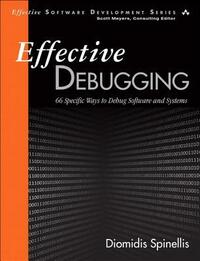Take a photo of a barcode or cover
1 review for:
Effective Debugging: 66 Specific Ways to Debug Software and Systems
Diomidis Spinellis
1 review for:
Effective Debugging: 66 Specific Ways to Debug Software and Systems
Diomidis Spinellis
Debugging to me feels like an extremely imperfect process - while most aspects of software engineering I do on a regular basis are informed by a mix of learning/reading with a heavy dose of experience/wisdom, debugging is one part that is purely experience, without ever having read a single book on the subject. Given how much I read and how much I learn from reading, I have assumed that while I'm good at debugging I'm really in a "tip of the iceberg" situation, and with the right kind of reading material I'd really max out my skills.
I first read "Debug It!" hoping it would provide the academic and formal learning that would turn me from an okay debugger into a master debugger. But in the end, that book wound up saying nothing new and I largely felt it was a waste of time.
I had hoped Effective Debugging, with it's subtitle of "66 Specific Ways" to debug and the "Effective *" moniker that I've come to associate with excellent books traditionally, would really teach me a lot. But alas, nope, it was stuff I already do. Sometime around Chapter 2 when Item 13 suggested I enlarge my window so that the entire line of a log file would fit, I started to realize that there probably is no book that will take me from an okay debugger to a master debugger. I think everyone's just an okay debugger and that's it.
I guess this book is worth skimming, especially if you're new to software engineering. But if you've been at it for any length of time, you could likely write this entire book if only you could be hyper aware enough of your debugging process to simply write down the stuff you're doing as though it was noteworthy, rather than second nature. Overall, I just didn't get much out of it, and I was really hoping I would. Two disappointing books in and I've given up, debugging can't be taught.
I first read "Debug It!" hoping it would provide the academic and formal learning that would turn me from an okay debugger into a master debugger. But in the end, that book wound up saying nothing new and I largely felt it was a waste of time.
I had hoped Effective Debugging, with it's subtitle of "66 Specific Ways" to debug and the "Effective *" moniker that I've come to associate with excellent books traditionally, would really teach me a lot. But alas, nope, it was stuff I already do. Sometime around Chapter 2 when Item 13 suggested I enlarge my window so that the entire line of a log file would fit, I started to realize that there probably is no book that will take me from an okay debugger to a master debugger. I think everyone's just an okay debugger and that's it.
I guess this book is worth skimming, especially if you're new to software engineering. But if you've been at it for any length of time, you could likely write this entire book if only you could be hyper aware enough of your debugging process to simply write down the stuff you're doing as though it was noteworthy, rather than second nature. Overall, I just didn't get much out of it, and I was really hoping I would. Two disappointing books in and I've given up, debugging can't be taught.
